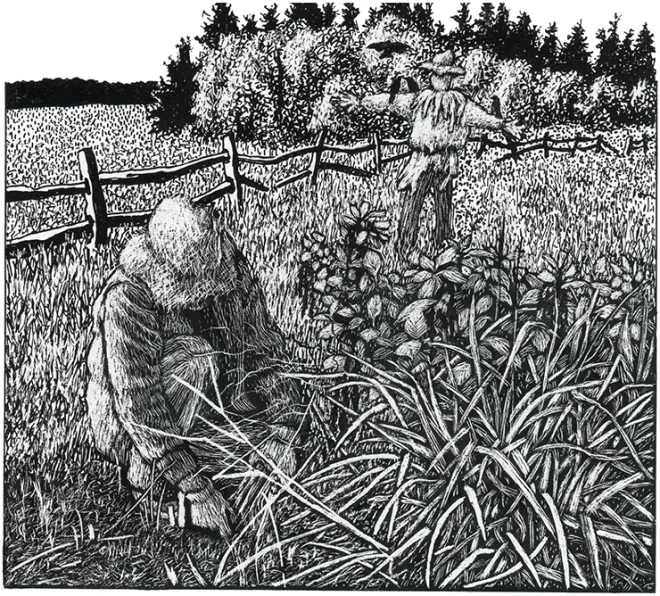Sometimes you get to the very end of something. That’s where I was at—at the end. There was nothing left that could be done. There were no more lies to tell and no more fights to fight: Every fight was just the same old tired fight. There was no more fooling myself, no courageous face to put forward. I was at the end of a marriage that couldn’t be saved. I had nowhere to go, nowhere to live, and no one to turn to for help.
On the day I knew there wasn’t a sliver of hope left, I walked out of my soon-not-my house and went into a field of wildflowers. I had planted this field myself, in better days when the sun seemed to shine brighter and feel warmer. The field had exploded in beautiful colors as it always did, a tribute to the constant abundance of nature. I wanted to walk and keep on walking and never stop. I didn’t wonder if that made any sense.
I saw a large flock of crows. Their squawking, screeching voices always set my nerves on edge. I looked over with a feeling of loathing—and saw an old scarecrow in the field. The crows were sitting on the old scarecrow’s hat and shoulders and having a grand old time.
I knew this scarecrow well—he had al-ways been in this field—but I had forgotten about him. I had named him Old Jack. He seemed a bit ragged, but then I was, too. His hat drooped down around his head, and his shoulders seemed a bit pointy, making him look bony and old. I guess we were even with that, as well. Still, how ridiculous—a scarecrow who couldn’t scare a crow.

The way things had gone in my life, it figured that I would have an un-scarecrow. Yet I couldn’t help but smile at how silly it all was. I decided to check him out, so I walked over—and scared the crows away, doing a better job than Old Jack had, although I’m not certain that’s something to brag about.
I looked out in the direction Old Jack was facing to see what he was looking at. Rye grass was choking out some amaranth I’d planted—amaranth, also known as love-lies-a-bleeding. If only I’d known then what I know now, I might not have planted it. Then again, I might have planted an entire field of it. I went over and pulled up all the rye grass. It was quite a job. It took about two hours. Fortunately, it had rained the night before, which helped with the roots. I piled it all up at the edge of the field under some oak trees. Then I went into the house to wash up and rest.
The next day, I went back into the field. I found Old Jack right where I’d left him the day before. I scared off the crows again—I’d like to think that Old Jack appreciated the gesture—and noticed that he was looking at a lot of flowers that needed to be deadheaded and tidied up. This field had once been something I was proud of. Now it had gone to rack and ruin. I had some clippers with me, so I deadheaded the flowers for a few hours. It was backbreaking work, but I didn’t have anywhere else to go, so I did it. I went in for lunch, rested a bit, then came out and finished the deadheading.
I decided to get rid of the weeds that had taken up residence but weren’t contributing to the beauty of the field. I don’t know why I took on such a monumental task, but I didn’t have anything else to do and it kept me busy. It took many days to do this, but eventually I got it done. I wore an old straw hat to help protect me from the sun. It was a better hat than Old Jack had, but not by much. What a pair we must have made!
Finally, I decided to reseed all the bare patches in the field. It was late August, and the perennials I was planting would still have plenty of time to grow and dig in for the winter. The following spring they would come up and produce magnificent blooms. Through all my work, Old Jack was my silent companion. Sometimes I talked to him. I began to look forward to seeing him: He reminded me of the simplicity of nature and that all things have their day and then die. All things need care and attention. Overgrown things must be cut back, and things no longer contributing must be eliminated. Weeding out the old is part of the natural world, and acceptance is a lot more peaceful than resistance.
I ended up getting divorced and the house was sold. I found a small place to stay temporarily. It was a nice little place. I drove by that field of wildflowers often the following summer and smiled at its beauty. I hoped others would drive by it and smile, too.
Some people say that angels have wings and harps and gossamer gowns. They can be cherubic and beautiful. Or they can be terrible, piercing the eye with brilliance. But sometimes, I think, they can just be tattered and bony and old. Sometimes they sit out in the fields with crows.
Years later, Old Jack is no longer in the field. I don’t know where he ended up.
But I know an angel when I see one. ❖
This article was published originally in 2017, in GreenPrints Issue #111.



